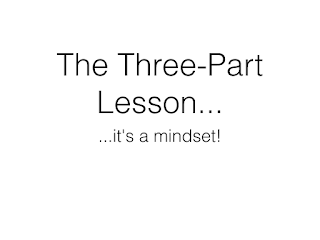It's mentioned in the clip that perhaps it's an Ontario thing, but it has its own Wikipedia entry, and John van de Walle is credited with coining the term.
When people in jobs like mine get pushback from teachers about how difficult, unwieldy, and time consuming it is to teach through the three part lesson, I often think, "they''re going about it wrong." We do get this kind of pushback-I have seen it myself in social media groups, comments along the lines of, "don't even get me started on the three part lesson!"
I don't blame them. Classroom teachers do a lot, and to be fair to teachers, designing a minds on/working on it/and consolidating the learning sequence for EVERY single lesson is probably impossible. That said, as the Ontario curriculum has it, "problem-solving is the mainstay of mathematical instruction"", and we are obliged to structure our teaching through interesting problems.
It's probably more useful and humane to think of the three part lesson as a mindset in itself.
Our math coordinator, Mary Fiore, has been making this point for a long time.
As she says:
Here is how we like to talk about this mindset:@MatthewOldridge @Dean_of_math it is way of thinking and a way of doing— Mary Fiore (@MaryFiore1) January 31, 2016
Don't think in terms of a set lesson plan, with time-bound sections. Activate student thinking with something interesting-something that inspires math to happen. If they explore this problem for an hour, a day, or even three days, so be it. Go where they take you. Watch and listen, and plan where you want to go next in your instructional sequence. Take note of any misconceptions you need to give lessons on.Some considerations to think about with the three-part lesson mindset. Activate/Develop/Consolidate Thinking. pic.twitter.com/2fkiyFDaZM— Matthew Oldridge (@MatthewOldridge) January 31, 2016
Above all, a lesson is only as good as its consolidation. Think about how you want to discuss the math at the end of the task. Consider whether your students will be sharing their work out loud, if you will be directing the consolidation, or if they will. Be purposeful and responsive. Teach through the three part lesson mindset!

No comments:
Post a Comment